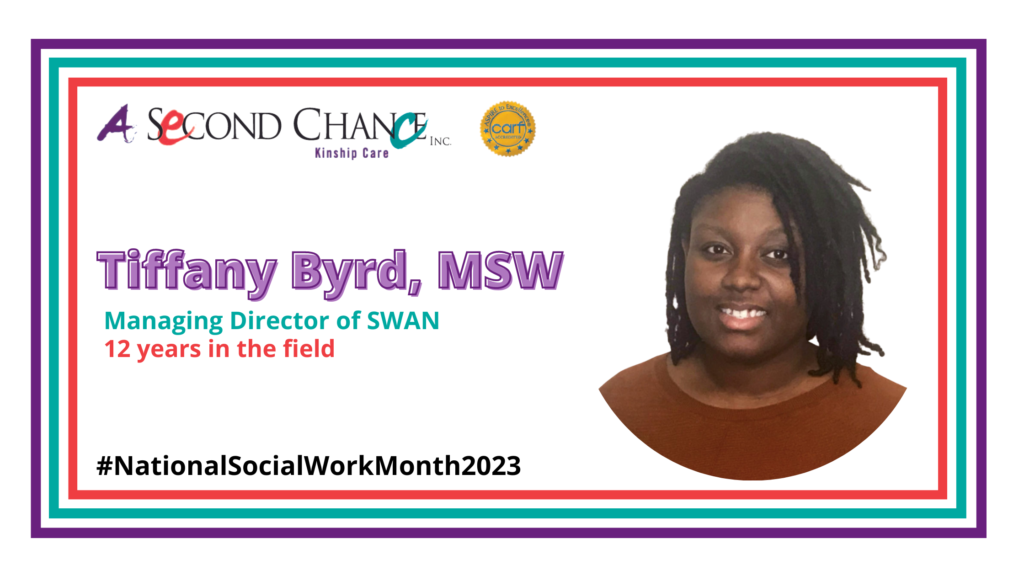Blog
#SocialWorkSuperhero Tiffany Byrd

ASCI: What challenges and benefits have you experienced as a child welfare caseworker?
Tiffany Byrd: As a child welfare caseworker, I experienced challenges around not understanding the “why?” behind decisions and changes within my role. This was primarily due to communication but also pushed me to anticipate change and navigate difference in a way I struggled to prior. That experience was challenging, but it helped to form a level of flexibility needed for my work and benefited in my professional growth.
ASCI: How have you seen kinship care practice evolve since you began in social work?
TB: When I first entered the Social Work field while working for the State of West Virginia the idea of kinship care was unthinkable. There was an assumption that Birth Parent difficulties were typically true for the family as a whole so kinship was not even considered. To move back to Philadelphia and learn of a kinship organization was exciting to say the least. Even now, conversations around kinship care with college friends who attended the same school of social work are changing and growing. ASCI is contributing to that change and helps to reduce trauma for children related to unnecessary non-kin removals. What I have seen is a move in a great direction!
ASCI: If applicable, how has your work and experience in kinship care been different than your work in traditional foster care?
TB: There are successes and losses in both foster and kinship care. The difference with kinship care is the child(ren) is/are often met with a familiar face at the time of removal, is able to maintain family connections, and when the child(ren) display unwelcomed behaviors they tend to receive fewer notices for removal.
ASCI: Did you learn about kinship care in your social work studies? If so, what information did you find most helpful to prepare you for working in this specific field? If not, what would have been helpful to learn to prepare you?
TB: Kinship care was never a subject matter in undergrad but by grad school, it was on the syllabus. I was working in the field at the time however the discussions were great!
ASCI: What has kept you working in this field?
TB: I have wanted to be a social worker since I was a child. I view social workers the same way I view superheroes. On our worst and/or best days, we help people. How many careers can claim that?
ASCI: What made you choose to practice casework/social in kinship care?
TB: As a child, my grandmother was my caregiver on and off as I traveled from foster home to group home. She could not afford to care for all of her grandchildren. Kinship care would have saved our family. The work we do at ASCI aligns with my personal values.
ASCI: How do you keep yourself from getting burned out?
TB: By taking breaks when possible and keeping the ‘why’ in mind on longer days.
ASCI: Can you recall any specific cases that were particularly fulfilling for you?
TB: Early on in my career I worked with a five-year-old boy who could recall being taken from his mother before he turned two years old. He would have severe behaviors after a few weeks in each home so notices for removal were consistent. Utilizing child-specific recruitment (CSR), we were able to place him with distant relatives who didn’t give up on him. Within a year, all of his behaviors stopped and the angry little boy began smiling in every picture.
ASCI: What skills should students of social work focus on developing? How would these skills help them excel as social workers?
TB: Flexibility, active listening, effective communication, and triage. No matter what area of the field you work in, possessing these skills can allow you to contribute to any team in an informed manner. As a caseworker or CEO, these basic skills can aide in success.
ASCI: What do you wish someone would have told you when you first entered social work?
TB: Everything you do effects someone else, not just the children and families, but [it impacts] your colleagues and leadership as well. It’s important to be a good worker and equally important to be a good colleague.
ASCI: What words of wisdom would you give the next generation of social workers?
TB: Whatever your passion is, remain in it; even if that means creating something no one else has ever seen before.
ASCI: What ways can/should employers support their social workers?
TB : Through listening. Social workers today thrive in intersecting environments that allow for positive intersections of their work and interests. Matching personal goals with professional projects is a great way to re-inspire team members and promote the retention within an organization.